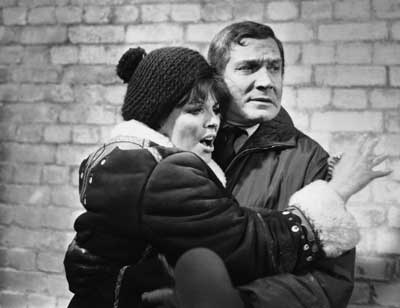All In a Day’s Work: Gene Barry, as Amos Burke in Burke’s Law, rescuing yet another damsel in distress.‘Never Trust a Blonde In a Blue Bikini—Burke’s Law!’
Gene Barry
June 14, 1919-December 10, 2009Gene Barry, one of television and the movies’ most versatile and personable actors, died December 9 at an assisted living facility in Woodland Hills, CA, at age 90. Barry began his career on Broadway opposite Mae West in Catherine Was Great (1944), starred in the 1953 alien-invasion film, War of the Worlds (and, along with his co-star Ann Robinson, had a cameo role in the Stephen Spielberg 2005 remake of same), and had a recurring role in one of television’s most beloved early sitcoms, Our Miss Brooks, starring Eve Arden. But he wrote his name large in post-war pop culture history with his starring roles as suave, cool law enforcement officials who disdained violence at all costs: first in the old west as Bat Masterson, who, as the show’s title song noted, was distinguished by his “cane and derby hat” (no gun; he could beat a villain senseless with his gold-handled cane faster than any bad guy could shoot at him), and later as Amos Burke, who demonstrated many of the Masterson character’s debonair traits in solving murder and extortion plots on Burke’s Law. Amos Burke was no ordinary detective, though, any more than Bat Masterson was any ordinary western lawman: an archetypal swinging ‘60s playboy, Burke, as Chief of Detectives in Los Angeles, typically arrived at crime scenes in a gleaming, chauffeur-driven Rolls-Royce Silver Cloud II, and preferred mind over muscle in solving cases; he also, invariably, wound up en flagrante (or it was suggested he did so) with a beautiful woman by show’s end. The tease began in the opening credits, when a woman’s voice was heard off camera seductively cooing, “It’s Burke’s Law,” as the show title flashed onscreen. Burke’s Law was in many ways a typical whodunit dilemma, but, as produced by Aaron Spelling, played out in a steamy atmosphere redolent with sex, money, intrigue and glamour, invariably drawing as guest stars many of the era’s cultural icons, such as Jayne Mansfield, Annette Funicello (who actually went against type and played a “bad girl” in one episode), Suzy Parker, Chris Noel and so on. Barry played Burke perfectly, as he had Bat Masterson, with a precise, well balanced blend of savvy, sexuality, droll humor and unyielding integrity, even in the face of the most suggestive come-ons his female suspects could muster.
The character of Amos Burke was initially portrayed by Dick Powell, on the first episode of The Dick Powell Show in September 1961, and Powell’s company, Four Star Television, produced the original Barry-starring series, which aired in 1963 and ’64 before being retooled (in response to the popularity of the James Bond films and The Man from U.N.C.L.E.) as Amos Burke, Secret Agent, with the title character now employed by a secret government agency but retaining many of the same traits. Unfortunately, the show did not retain the pizzazz of its original model, and was dropped after only 17 episodes had aired. In 1990 he reprised his role as Bat Masterson, starring in two episodes of Guns of Paradise with his contemporary TV western star Hugh O’Brian, reprising the TV role that made him famous, Wyatt Earp; the two were re-teamed as those iconic characters a year later in The Gambler Returns: Luck of the Draw. A 1994-95 revival of Burke’s Law, produced by Aaron Spelling and featuring Burke now assisted by his son, Peter (played by Peter Barton), captured none of the original’s flair, but engendered mostly camp appeal in bringing back stars of other ‘60s spy shows, such as The Avengers’ Patrick Macnee, as well as Anne Francis, who had portrayed Honey West in the original series before starring as the high-flying female detective in her own series. An interesting footnote to Barry's TV career was his role as a murderous psychiatrist in the 1968 TV movie, Prescription: Murder, which introduced Peter Falk as Lt. Columbo.
Onstage in the ‘80s, Barry played President Richard M. Nixon in a 1982 Atlanta production of Watergate: A Musical, but gained more notoriety a year later for his Tony-nominated role as a gay nightclub owner raising a son in La Cage aux Folles. His portrayal was consistent with the integrity of all the characters he had created on stage and on screen. As he told a New York Times reporter: “I’m not playing a homosexual. I’m playing a person who cares deeply about another person. The role is loving another person onstage. It doesn’t matter whether it’s a man, a woman or a giraffe. It has nothing to do with sexuality, as far as I’m concerned. I play the diginity of the man, his concern for his lover and his concern and love for the son.”
Gene Barry was born Eugene Klass in New York City on June 14, 1919. He is survived by his sons, Michael and Frederick, and his daughter, Elizabeth, as well as three grandchildren and two great-grandchildren. His wife, Betty (Betty Clair Kalb, whom he met when both were performing in New York City) preceded him in death in 2003, after nearly 58 years of marriage.
Founder/Publisher/Editor: David McGee
Contributing Editors: Billy Altman, Laura Fissinger, Christopher Hill, Derk Richardson
Logo Design: John Mendelsohn (www.johnmendelsohn.com)
Website Design: Kieran McGee (www.kieranmcgee.com)
Staff Photographers: Audrey Harrod (Louisville, KY; www.flickr.com/audreyharrod), Alicia Zappier (New York)
E-mail: thebluegrassspecial@gmail.com
Mailing Address: David McGee, 201 W. 85 St.—5B, New York, NY 10024


